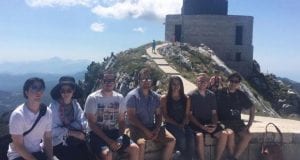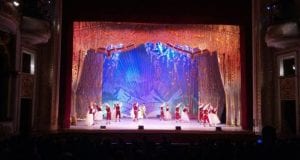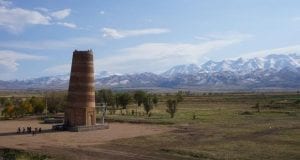Jon Harris is an MA student at the Center for Slavic and East European Studies. He recieved a 2016 summer FLAS fellowship to learn Bosnian-Serbian-Croatian (BCS). He spent the summer between the University of Pittsburgh’s Summer Language Institute (SLI) and the University of Donja Gorica (UDG) in Podgorica, Montenegro, improving his language skills and experiencing the culture of each place.

Mount Lovcen
“I participated in an intensive ten-week course at the University of Pittsburgh’s Summer Language Institute (SLI), which is renowned for offering critical and less commonly taught languages. One of the many strengths of this particular program is that language courses are offered in a hybrid format, which allows students to combine six weeks of domestic study at the Pitt campus with an optional four-week study abroad component. As such, my time was split between the University of Pittsburgh and the University of Donja Gorica (UDG) in Podgorica, Montenegro.
The structure of this program was highly beneficial in that I completed one academic year’s worth of language training at Pitt prior to departing for Podgorica. Therefore, when I arrived in Montenegro, I was able to converse with a greater degree of fluency across a wider range of topics. This truly allowed for me to make the most of my time spent abroad.
As a person from the Buckeye State, I had been conditioned to scowl at the sight of black, yellow, and all things pertaining to Pittsburgh. However, after putting aside deep-seated sports rivalries, I began to fall in love with the Steel City. Pittsburgh is nothing if not beautiful; situated in the foothills of the Allegheny Mountains, there is no shortage of breathtaking vantage points to take in the best views of the city’s forests and rivers.

BCS textbooks
Despite the urban setting of the University of Pittsburgh, there are plenty of green spaces for recreation and relaxation between classes. The crowning gem of the Pitt campus is, unmistakably, the Cathedral of Learning, a Late Gothic Revival cathedral standing at 535 feet. Every morning for six weeks, I attended classes in the basement of this iconic, towering edifice. Upon entering the threshold of the building, the intellectual atmosphere permeating the Cathedral of Learning becomes instantly palpable, as if one is carrying the torch of an academic tradition larger than him or herself. The Cathedral is also home to the widely known Nationality Rooms in which artifacts from 30 different nationalities are continually on display.
In addition to 180 hours of classroom instruction, SLI provided ample opportunities for language learning in informal social settings. Pizza Tuesdays, Lunch with the Instructors Thursdays, and Film Fridays allotted time for students to practice their respective target languages in a fun, carefree manner. At the end of each week, all SLI students would congregate for Language Happy Hour, a weekly picnic hosted by students and instructors of the various language groups. The South Slavic language group, represented by students of BCS and Bulgarian, prepared traditional food and drink for the event in addition to performing songs and dances.

Black lake in National Park Durmitor
Studying BCS—or any Slavic language, for that matter—in Pittsburgh is particularly beneficial. Owing largely to the legacy of the early U.S. steel industry, the Slavic communities within Pittsburgh are strikingly visible. For the duration of my stay in Pittsburgh, I resided in the picturesque Polish Hill, a thriving neighborhood replete with Polish delis and a Catholic church. I ate ćevapi, somun, and ajvar at the Bosnian markets; I attended an all-Croatian mass at St. Nicholas Catholic Church; and I even heard a sermon in Russian at the Дом молитвы для всех. Upon becoming a member of the Carnegie Public Library, I had a seemingly infinite reserve of BCS grammar textbooks at my disposal. For these reasons, the initial six weeks spent in Pittsburgh prepared me exceedingly well for the transition to Podgorica.
In my experience, academic and otherwise, Montenegro is often overshadowed by her Balkan brothers of Bosnia, Croatia, and Serbia. When I arrived in Podgorica, the capital of this small, mountainous country, the air bustled with patriotic fervor in both celebration of ten years of national independence and the 2016 Rio Olympic Games. Prior to studying abroad in Montenegro, I had never heard anybody, personally, refer to their mother tongue as crnogorski (Montenegrin). The unique Serbo-Croatian dialects spoken in Montenegro were traditionally referred to as Serbian; however, in the wake of national independence, the Montenegrin variant is becoming more and more standardized. As a student of the Balkans, this was exciting to witness firsthand.
For four weeks, I studied BCS with six other students from Pitt at UDG, the largest private university in Montenegro. Because I was the only advanced-level student, UDG provided me with one-on-one tutoring sessions prior to our normal classes. This month-long course emphasized practical BCS, which was particularly useful for navigating daily interactions at restaurants, stores, and on the streets.

View from Tara Bridge in Zabljak
Language instruction and cultural lessons took place not only within the classroom but also outdoors. Our instructor devised a curriculum that incorporated weekly excursions to the awe-inspiring national parks of Montenegro. We climbed the 461 steps of Mount Lovćen to visit the Mausoleum of Petar II Petrović-Njegoš, the final resting place of the most revered Montenegrin writer and national hero. We spent an entire afternoon hiking around the turquoise glacial lakes of National Park Durmitor. Traveling along the Montenegrin Adriatic coast, we visited the exceptionally beautiful towns of Budva, Kotor, Perast, and Tivat. In Virpazar, we beheld the ancient ramparts of the Besac Fortress, which was built by Ottoman Turks at the end of the 15th century. Montenegro truly offers some of the most memorable landscapes in the world, too numerous to list here.
In both Pittsburgh and Podgorica, I dramatically improved my mastery of BCS, acquired new experiences, and made personal and professional connections that will last me a lifetime. I was so impacted by my time spent overseas that I am currently applying for career opportunities in Montenegro. As such, I wholeheartedly recommend Pitt’s SLI program, which offers approximately ten Slavic languages annually, to all future FLAS applicants.”















